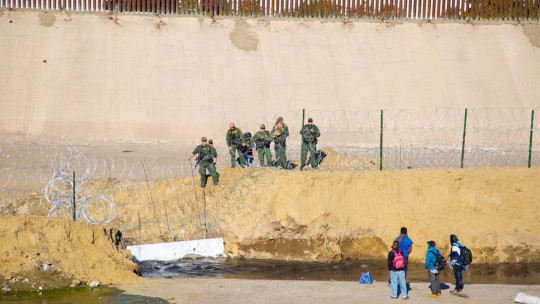
The immigration process is a highly stressful time for anyone who is forced to leave their homeland to go live in a place where they are not sure that things will go well for them.
Doubts, fears, fear of being rejected or difficulties in adapting make the migrant fear that their immigration project will not succeed. He may feel that arriving in his new country is a new opportunity or, otherwise, a huge risk.
This psychological phenomenon has been called acculturation stress an emotion that, although it is normal for every migrant to feel at some point during their migratory experience, if it continues, it can cause serious problems for their mental health.
What is acculturation stress?
Acculturation stress is a psychological process that displaced people suffer when they arrive in their host land and face all kinds of changes and differences with respect to their land of origin. In itself, We understand acculturation to be the set of processes that a foreign person undertakes in order to adapt to the new society that he has had to live.
Normally, this process is not comfortable to do, since it implies profound changes in the individual, in addition to not being sure that they will achieve it, which can generate (dis)adaptive stress.
The concept of acculturation stress It was coined by John Widdup Berry, a psychologist specializing in issues related to the adaptation of immigrants and indigenous peoples after establishing cultural contacts with other ethnic groups.
He introduced it in the 1970s, using it as an alternative term to “cultural shock”, which had quite negative connotations since with “shock” (“blow”, “shock”) it was implied that, for Of necessity, the introduction of people from one culture to another had to end, in one way or another, in some type of violence.
When we talk about stress as something adaptive, some may be surprised. In the society in which we live, the word “stress” tends to be perceived as something negative, but this is not entirely so. Stress is the response to a situation in which our physical and mental integrity can be put at risk and in which, in order to survive or move forward, it is necessary that we have some type of response, especially of the fight or flight type.
Extrapolated to the migration process, we can understand stress as the feeling that will not leave the displaced person indifferent. Being faced with a new world, this person cannot sit idly by, he has to do something to move forward. Stress is what wakes her up and motivates her to find the resources to adapt to the new land of origin The moment you have achieved this, this stress, which has been essential for your survival, will disappear.
The problem with acculturation stress is that it can be a double-edged sword. As we have just mentioned, it is the motivator for the person to make an effort to be part of where they have to live, putting all the resources they have at their disposal. The problem is that your immigration project does not always work, added to a possible rejection by the locals and the difficulty in adapting to new traditions, language and other cultural characteristics
This causes the acculturation process to take a long time, making it seem like the person is unable to adapt to the new place of residence. As acculturation lengthens, so does stress and this emotion, sustained for a long time, can be a source of all types of psychopathology. Migration is not a psychological problem, but it is a risk factor and, if the migrant’s own experience is not well managed, this will generate depressive disorders, anxiety and psychosomatization in the form of fatigue.
In short, acculturation stress, along with migratory grief, is that process that can motivate the person to activate to adapt to the new country but, also, If it is not managed properly and the person does not have the necessary resources for it, it can end in failure and subsequently become a great source of discomfort psychological and physical. No matter how natural and motivating stress may be, migration still implies a great sacrifice for the migrant and if the situation overwhelms the migrant, the sustained pressure will harm them.
Predisposing factors
In itself, the pure and neutral definition of acculturation stress is simply the discomfort experienced when ending up in a place whose culture is significantly different from that of origin.
As we mentioned, this discomfort is not bad in itself but it is annoying, which It will motivate the person to look for strategies to reduce it and those strategies are focused on adapting to the new place of residence that is, being able to successfully carry out the series of psychological, social and economic changes that acculturation implies.
This acculturation stress will be greater or less depending on different factors, among which we can find the following:
All these factors bring with them psychological problems if the person is not able to cope with them or if they harass him a lot It is clear that, in itself, learning a new language is not something as complicated or difficult to manage as seeing how the inhabitants of the region where you have ended up are not very friendly towards foreigners, or if the state It does little to help people feel comfortable with their new home.
This is why if these factors occur and the person does not have the resources to cope with them, sooner or later their stress associated with their attempts at acculturation will end up progressing to psychological problems, which will make it even more difficult to adapt to their new territory. .
What consequences does it entail?
As we have already said, stress is not a bad thing in itself. It can be the “spark” that makes a migrant prepare to adapt to their new land, seeking support from the locals themselves, learning the local language and actively getting involved in the traditions and culture of their new country.
If the land in which you live is very open to immigrants, although you will never completely detach yourself from your country of origin, you will not feel separated from where you live The main positive consequence of acculturation stress is that, adapting.
But, as we said, if the acculturation process is failing and stress, the same emotion that should help wake up the migrant, far from helping him adapt, what it is doing is overwhelming him even more when we talk about psychopathology. The person may want to adapt, but the environment in which they live does not welcome them with open arms, in addition to You may not have access to resources such as health, education and money that would help you move forward with your immigration project
Due to all this, as negative consequences we have feelings of isolation, rejection, anxiety, psychosomatic disorders and depression. Furthermore, these problems progressively wear down the immigrant’s health more and more, not only because the immigration project continues to fail but also, whether due to lack of money or a very low awareness of mental health, these people are very few likely to receive psychological help.
Acculturation stress could be considered the step immediately prior to experiencing Ulysses syndrome This picture, coined by the psychiatrist Joseba Achotegui in 2002, arises in the face of forced separation from loved ones, which represents a rupture of the instinct of attachment, a feeling of desperation due to the failure of the immigration project and the absence of opportunities, along with the They struggle to get the basics, such as food and a roof over their heads. Many people arrive to their new country of origin through mafias illegally, which means the constant fear of being deported.
Interestingly, acculturation stress It not only affects migrants, but also locals Associated with culture shock, the inhabitants of the receiving land, both “their own” and descendants of the 2nd, 3rd or 4th generation of other immigrants, may see the new relatives as an economic threat or competitors for resources. It is at this moment that due to intergroup contact conflicts appear between these groups, reinforcing the preference for the ingroup and seeing the outgroup as dangerous.








